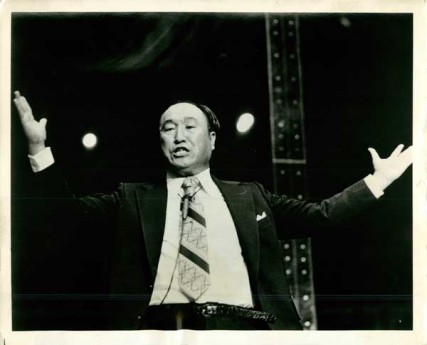
The Rev. Sun Myung Moon, revered as a messiah within his Unification Church but regarded by many others as a vain and enigmatic man who blessed mass weddings, built a sprawling business empire and presided over a personality cult, died on Monday (Sept. 3) in South Korea. He was 92.
Moon had been in intensive care at a Seoul hospital since Aug. 7, according to his church. The cause of death was complications from pneumonia, including kidney failure.
Moon was born in 1920 in what is now North Korea, and rose from a home in which five siblings starved to death to become an ambitious man who harbored a lifelong hatred of communism, craved respect from the rich and powerful and professed a divine mandate to restore a fallen world.
He claimed to have received revelations from Jesus, Confucius, the Buddha, Lao Tzu and Satan.
After founding the Unification Church in 1954, Moon gained fame by holding group weddings for arranged couples, many of whom had barely met before Moon matched them. Ceremonies at New York's Madison Square Garden in 1982, Washington's RFK Stadium in 1997 and Seoul's Olympic Stadium in 1999, drew thousands of couples.
“From the time I was eight I was a well-known as a champion matchmaker,” Moon wrote in his biography, “As a Peace-loving Global Citizen.”
“I had only to see photos of a prospective bride and groom and I could tell everything.” Moon matched thousands of Unificationists, but largely left the job to parents and other church officials in his last years.
If the matches were not always made in heaven, Moon believed that they would nonetheless foster a paradise on earth.
Moon taught that Jesus had died without fathering children, who, as the Messiah's heirs, would have escaped the taint of Original Sin. Moon said Christ chose him to complete his mission by uniting humankind in a single sinless family. Many of Moon's arranged marriages were thus interracial and international. Unificationists called Moon and his wife, Hak Ja Han, the “True Parents” of this spiritually pure lineage.
In the early 1970s, Moon moved to the United States and embarked on multi-city “Day of Hope” crusades, and later addressed thousands at Madison Square Garden, Congress, the Washington Monument and Yankee Stadium. At its height, the Unification Church counted nearly 30,000 members in the U.S.
But as Moon gained prominence in the United States, critics accused his church of deceiving converts and brainwashing members. Followers were inducted into “mobile fundraising teams” who sold candy and flowers. Others labored for the church's many business interests, a practice that extended to Unification branches in Asia as well, said Ji-il Tark, a scholar at Busan Presbyterian University in South Korea who has studied Moon's movement.
Moon himself resided for a time on an 22-acre estate in Tarrytown, N.Y. He served 13 months in federal prison in 1983-84 for tax evasion and conspiracy to obstruct justice.
During the mid-1970s and 1980s, U.S. membership sank as the “cult” accusations swelled. Scholars estimate that there are now 100,000 Unificationists worldwide and a few thousand in the U.S., far fewer than the multi-million membership the church claims.
Moon and his followers remained embittered that American Christians failed to embrace their church. The National Council of Churches, for example, refused to admit the Unification Church as a member. Most Christians called Moon's messianic claims heretical.
Moon businesses prospered, even as his church faltered. Its Tongil Group is one of the largest conglomerates in South Korea. It also owns a gun manufacturer, sushi distributor and the New Yorker Hotel in Manhattan.
Moon's media holding company, News World Communication, which owns the Washington Times and United Press International, is less profitable, but Moon boasted that it offered access to Washington power players and a venue for his conservative political views.
Moon's oddball antics, however, sometimes overshadowed his theological and business interests.
In 2004, more than a dozen lawmakers attended a Capitol Hill reception, where Moon declared himself “humanity's savior, messiah, returning Lord,” claimed to have communed with Hitler and Stalin and was crowned by a sitting congressman, Rep. Danny Davis, D-Ill. The lawmakers later said they were “duped” into attending the reception.
Even Moon's closest followers admitted some bafflement at his prophecies.
“He is always expanding even his own theological definitions and challenging those around him,” said the Rev. Tyler Hendricks, past president of the Unification Church in America and the Unification Theological Seminary in Barrytown, N.Y. “It was kind of like, 'What is he going to come up with now?'”
Late in his life, Moon preached about the “god of day and god of night,” Hendricks said during an interview last March in New York, as Moon presided one of his last mass weddings via satellite from South Korea. “Members are trying to figure out what that means. He doesn't always speak clearly or logically.”
In recent years, Unificationists in the U.S. have tried to drum up interest in the church by touting studies that suggest arranged marriages may last longer than “love” nuptials. According to one church study, 70 percent of the couples Moon matched at a 1971 ceremony in New York remain wed. (The mass blessings are not legal weddings; couples have civil ceremonies before or afterward.)
While Moon's children have stepped into church leadership roles, Hendricks said he expects the mass wedding ceremonies to cease with the patriarch's passing. And Despite Moon's intense focus on happy families, the handover to his heirs has been riven by internecine strife. Some of his children have split from the church, abused drugs and fought bitterly for control of the church's business empire. With Moon's death, the fighting is expected to intensify.






